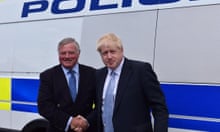A meme did the rounds on Saturday morning that offered a theory of why Labour had done so badly in the local elections.
It read: “Labour: a bunch of rich people convincing poor people to vote for rich people by telling poor people that ‘other’ rich people are the reason they are poor.”
It may be true that any attacks Labour launched on expensive Tory tastes in interior design did not seem to put voters off. As one voter in Teesside told the FT last week: “Boris deserves nice curtains given what he’s been through with Covid.”
But look at where Labour did well – Wales, Greater Manchester, the Liverpool city region, Preston – and you can see that where the party led with conviction, promoting a positive vision for their local area, it was rewarded at the ballot box.
Some of the more significant signs of green shoots for Labour were in southern England. The former MP Dan Norris was elected mayor for the West of England, taking the seat from the Conservative incumbent with 59.5% of the vote. In Cambridgeshire and Peterborough, Labour’s Nik Johnson took the seat from the Conservatives with 51.3% of the vote.
In contrast to the results in “red wall” areas of England, Norris said Starmer had “unlocked this election” in the Bristol region and that he felt Labour was still the party of the working class.
In Preston, where the Labour administration has pioneered a form of localism known as the Preston model, it retained all 10 seats it was defending. The idea is simple: the council keeps money as close to home as possible so that the amount spent locally goes up. Where other authorities privatised, Preston has grown its own businesses and created worker-owned co-operatives.
In the Liverpool city region, where Steve Rotheram has led a skills- and digital-based agenda, he was rewarded with an only slightly reduced vote share – a minor miracle given the corruption investigation that engulfed Liverpool city council in recent months.
He can justifiably claim a strong personal vote. According to his team, his final result of 58.2% of the vote, just one percentage point down on 2017, was 12% up on Labour’s overall vote share in the local council elections across the city region on Thursday.
Labour’s strong performance in Wales also shows “the importance of being in power and doing stuff”, tweeted former Labour MP Caroline Flint, who lost her Don Valley seat in 2019. “Their success is a reflection on how the pandemic has been handled: focus on matters people care about and still deep ties with communities,” she added.
In Greater Manchester, Andy Burnham won a huge victory and the “sensible socialist” mayor of Salford, Paul Dennett, increased his vote share to 59%, a 10% increase on his first preference performance in 2016.
In his victory speech, Dennett said he had bucked the national trend with a “message of hope and optimism”. He said he had tried to influence Salford’s growth “to ensure it benefits the residents who live here”, bringing services back to the council and building social housing once more – “something many people told us was impossible”.
He criticised Labour nationally for lacking an industrial strategy for the red wall. “Instead, we embraced the new global economy of finance and services – bleeding yet more life out of the towns where our voters traditionally came from.”
He asked Keir Starmer to “look not only to Salford but to Greater Manchester under the leadership of Andy Burnham,” saying: “There is a path Labour can take, which unites our traditional voters with young, and new voters.”
Antonia Jennings, the associate director of the Centre for Local Economic Strategies, said: “While nationally the picture has been grim for Labour, where we have seen them put forward candidates that are locally rooted and promoting community wealth-building programmes (eg Preston, Salford), they’ve been successful.”
She said it was right for the opposition to point out the government’s failures in the pandemic, but that you could not win on negativity alone. “People aren’t going to vote for you because you are a good critic. You’ve got to have something to say and you need to offer an alternative.”









